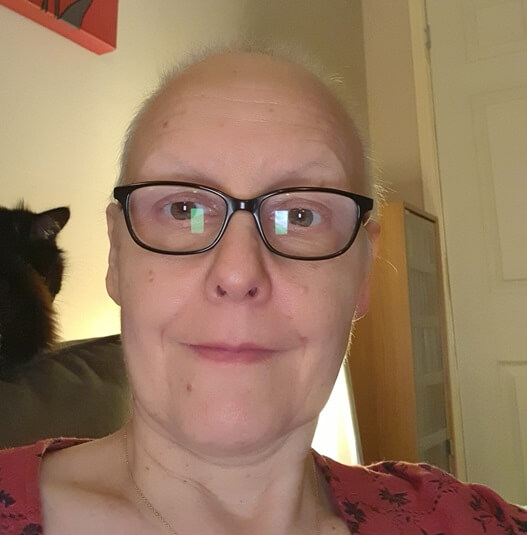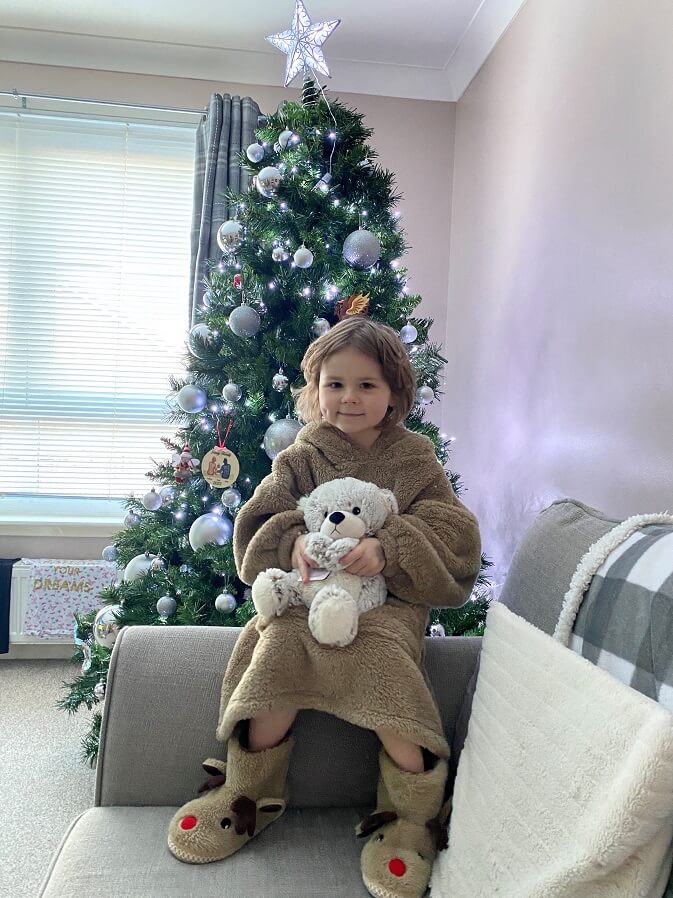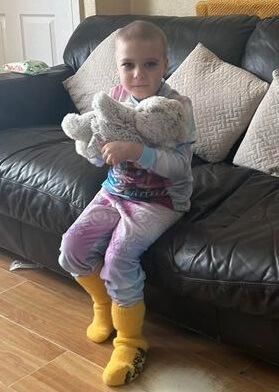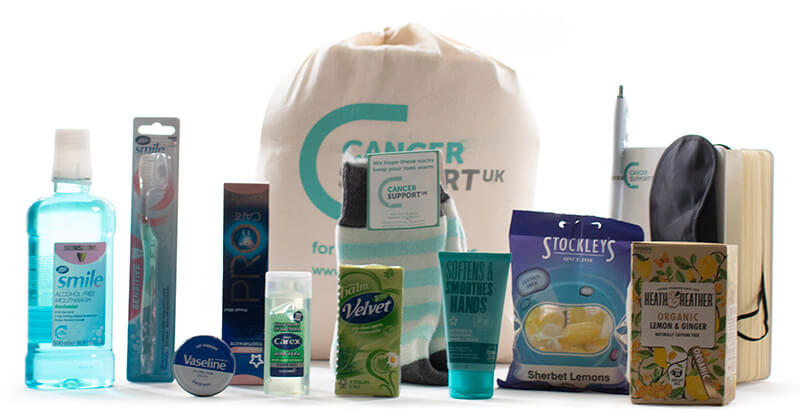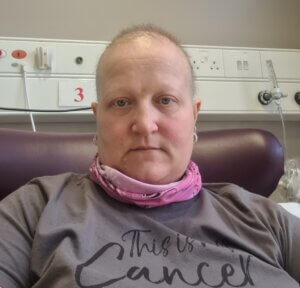
“My cancer diagnosis left me an emotional wreck.” Sam, Cancer Coach participant
Cancer Coach provided a lifeline to Sam when she needed it most. When her cancer treatment finished, everyone expected Sam to return to her old self, but inside she felt acutely lonely and an emotional wreck. As the COVID pandemic was still raging, she had to remain indoors, as her immune system was severely weakened, so her isolation was further exacerbated. Cancer Coach’s remote peer support groups made a big difference to Sam – knowing that there were other people who all felt the same way and who had experienced cancer, boosted her emotionally.
Sam’s cancer experience began in 2019 when she was diagnosed in October with triple negative breast cancer. She was just 46 years old.
“They told me it was quite a rare and aggressive cancer, but said I would be ok,” Sam recalls. “My world fell apart hearing just the word cancer.
“It all started when I found a tiny lump in my breast. I saw my GP, who didn’t think it was anything to worry about.
“I had a mammogram and ultrasound, and a core needle test. When I received the news that I had cancer, I thought I was going to die. I literally saw it as a death sentence.
“Everyone in the office was so nice to me about my diagnosis, which made me feel even worse. In comparison, my family gave me very little support, although my sister did come to the hospital.
“The surgeon said that because the lump was only a couple of centimetres in size, they were going to carry out a lumpectomy.
The results came through in November. The surgeon confirmed that although the surgery had eliminated the original cancer, a proportion of it had spread into Sam’s lymph nodes. So, in December 2019, she began a year-long sequence of treatments, including chemotherapy, radiotherapy and oral chemo therapy.
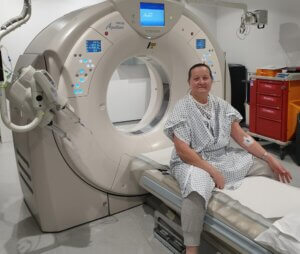
Sam felt isolated and terribly lonely during and after treatment
“I didn’t find the treatment too hard. The main side effects were fatigue and an awful furry feeling in my mouth – everything I ate tasted like carpet. Although I wasn’t able to do much physical activity, I did manage to work a few hours a day, which helped keep me sane and my mind working.
Emotionally, however, Sam struggled to keep afloat, particularly as she lives alone. Nobody could visit her because of COVID and the only time she left the house was for hospital appointments. Neighbours, friends and an ex-work colleague provided a lifeline, checking to see that she was alright and taking her to appointments.
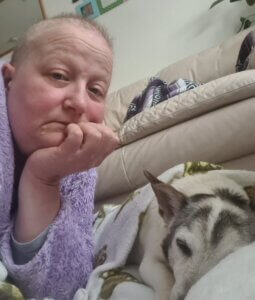
Sam’s faithful dog was there for her during treatment
“I tried to keep a smile on my face and to stay positive, but inwardly I was crying, which bothered me. It was horrible feeling so lonely. I had an elderly dog for company, but he was ill. He lasted until my chemo finished – I think he knew I needed him.
“Everyone expects you to get on with it and to be like you were before cancer, but chemo had sent me into menopause, so I had chemo brain and menopause brain. I didn’t want to keep phoning my kind neighbour or my friend who had experienced breast cancer.
“I found it really upsetting that people expected me to be the same. It really got to me that some people couldn’t see what was wrong with me. They would say there is no excuse for you to feel ill, you look alright, so why aren’t you alright?
“In the end things got so bad that I called my GP. I was referred to Isabel Hospice, who offered me a wellbeing visit and weekly reflexology and acupuncture appointments. This did made me feel better. I also used Breast Cancer Care, which put me in touch with someone with a similar diagnosis.
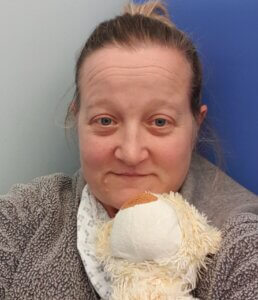
Outwardly Sam kept smiling, but internally she was crying and desperately lonely
“I first learnt about Cancer Support UK and Cancer Coach when I ordered a Cancer Kit. The leaflet mentioned how when you’ve finished treatment everyone thinks you go back to normal, and how you still feel alone once treatment finishes, even though you have people around you. That’s why, at the end of 2020, I signed up for Cancer Coach.
“It was so good to be part of a small group of people, all feeling the same way, yet different. It was great to be able to talk to each other and to share tips and ideas in the group. The coach was really nice, too.
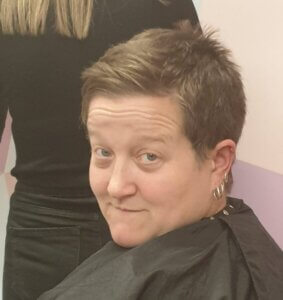
Cancer Coach changed Sam’s life, enabling her talk through her feelings and experiences with people in a similar situation to herself
“I learnt how to keep a worry diary and to set aside an hour per week when I would allow myself to worry about things. Then spend the rest of the time putting my focus on more productive thoughts. We were given tools to deal with our emotions and learnt that it’s ok to feel different after cancer. We also learnt to accept the new normal.
“At the end of the six-week programme, we all wanted to stay in touch with each other. We kept our weekly Zoom sessions every Monday and now we’re all on Whats App. Without that continuity it would have been very hard. It’s amazing that I still have these other people in my life, even though it’s four years since we first met. Nowadays, we don’t talk about our cancer treatment, instead we discuss the future. The only cancer topic that gets mentioned is the cancer checks, which we all still worry about.
“It’s so good to have these people in my life – your charity has been such a help. If it wasn’t for Cancer Coach, I wouldn’t have met these ladies and I wouldn’t have understood my feelings and found ways to move forwards with my life.
“I would definitely recommend that people sign up for Cancer Coach. It changes your life.
Cancer Coach peer support groups are run by Cancer Support UK for people with a previous primary cancer diagnosis, who have finished their cancer treatment and need someone to speak to. The groups are split into weekly sessions over six weeks and are carried out free of charge by telephone or over a video call. Each group is facilitated by an experienced Cancer Coach who leads the group, offers support and structures the conversation.
Cancer Coach is for anyone over the age of 18 who has completed treatment for cancer, regardless of whether they finished treatment a few months ago or a few years ago. Apply to join a Cancer Coach support group online now.
